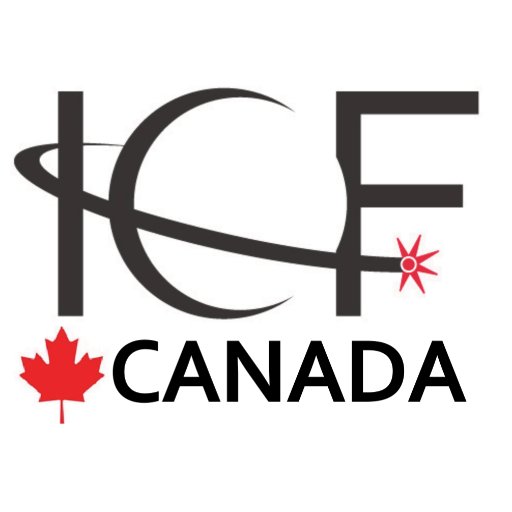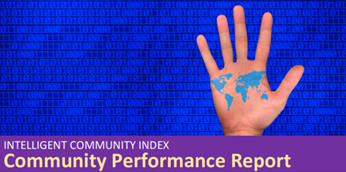
ICF Canada Newsletter #34 July 26, 2017

Is your City Smart?
Want to Prove it to the World?
Benchmark to win a 2018 Smart21 ICF Award
Deadline September 13
Submissions are open for the 2018 Intelligent Community Awards Program: See the http://www.intelligentcommunity.org/nominations and https://icf-canada.com/ Websites for details on how you can be recognized as a 2018 SMART21 Community in October 2017, which is the first stage leading to the TOP7 award and Intelligent Community of the Year in 2018.
Humanizing Data

The Intelligent Community Forum selects a theme annually for its annual awards, summit theme and annual focus to help to channel thought leadership among its community members. Why has “Humanizing Data” been selected for 2018?
Data has become the heartbeat of the new economy and the lifeblood of smart public policy in the 21st Century. Two words born in the mid-1990s still shape our understanding of data’s central role. Engineers at Silicon Graphics, an early tech innovator, began talking about “Big Data” at about the same time the words “Open Data” first appeared in a report, which advocated for the free exchange of scientific information. Two decades later, Big Data describes the high-speed collection, processing and availability of huge volumes of information. What once required days, weeks or months of computer time can now be processed and displayed in real time. Greater processing capacity has encouraged us to add sensors to objects, animals and even to ourselves, and to “scrape” the digital streams of the Internet to generate an even greater flood of data. By getting us answers sooner, Big Data delivers greater value. It also reveals patterns we might never have suspected were there, but which alter our decisions, investments and our well-being. The impact on businesses and institutions already mounts into the billions, measured by cost-savings, convenience, operational improvements and new forms of economic activity.
If data is Big, however, does it only belong to Big companies and Big institutions? Where do individuals and communities fit in a data-driven future?
That’s where Big meets Open. The global Open Data movement has driven municipal, state, provincial and national governments to publish data sets from the vast store of information they collect. Researchers, hackathons and entrepreneurs explore the spread of disease and crime, create real-time transit schedules and develop quality audits for everything from hospitals to restaurants, instantly on smartphones. New companies spring up to make money from this release of “the peoples’ property,” including such firms as the real estate website Zillow and Garmin, a US$7 billion maker of navigation software and hardware. Governments save money by attracting more bidders for contracts and delivering useful up-to-the-minute information online rather than through call centers. Where governments are committed to transparency, Open Data is shrinking the shadows where corruption flourishes.
As data has become a matter of public policy, its quality, use and interpretation have become the stuff of debate. Data touches issues from privacy and security to economic inequality, and from the right to claim an individual identity to the “right to be forgotten.” Technologists complain about a lack of standards that force them to devote countless hours to preparing government data for use. Open Data advocates demand that information be free – while most governments reserve the right to determine what citizens need to know.
Whether big, open or both, data is the beating heart of business and government. By fueling a better-informed society, it supports human hopes and human potential. It is valuable when it contributes to prosperity, knowledge, safety, cultural richness and greater collaboration, and it is threatening when directed to lesser goals. In the 2018 Intelligent Community Awards and Summit, we celebrate the people, the communities and the innovators who are humanizing data for the economic, social and cultural benefit of the community. We will identify and honor those whose technical accomplishments lead to less poverty, greater health, higher hopes and longer and richer lives, beginning in the first and most important place of all: the place called home.
The Effects of Successful ICT-based Smart City Services from Citizens’ Perspectives
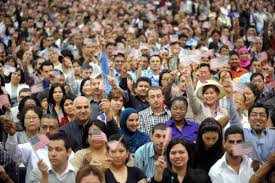
Hsiaoping Yeh, Associate Professor in the Department of Marketing & Logistics Management at National Kaohsiung First University of Science and Technology in Taiwan undertook a survey of citizens from cities that have participated in the Intelligent Community Forum’s ICF Awards program. Her report highlights include:
- ICT-based smart city services increase citizens overall quality of life
- The more usage of the ICT-based smart city services, the higher the quality of life achieved.
- Citizens’ accepting and using ICT-based smart city services can be influenced by their social groups.
- ICT-based smart city services should focus on service quality, innovation concepts, and the protection of users’ privacy.
“The effects of successful ICT-based smart city services: From citizens’ perspectives” focuses on the question of adoption of information and communication technology (ICT) applications for the development of innovative, sustainable, and smart cities. Furthermore, the study suggests that It has become a new model for municipal cooperation between government and corporations. According to the study: “Smart cities contribute to social stability and economic prosperity by encouraging and enabling corporations to invest their resources and expertise in the cities, and by providing more prosperity and contentment for their citizens. Smart city services provide citizens with an improved living environment and increase their overall quality of life. Since the citizens are the users of the services, it is vitally important that their ideas and perspectives are taken into account during the planning and management of such services. This study surveyed citizens in Taiwanese cities that had all participated in the Intelligent Community Forum smart city campaigns at least once. The findings reveal that citizens are willing to accept and use ICT-based smart city services if the services are designed with innovative concepts that secure their privacy and offer a high quality of services. The more they use the services, the higher the quality of life achieved. The only factor that does not influence citizens’ acceptance and usage of ICT-based smart city services is their city engagement. The study contributes to the academic literature and also provides practical pointers for cities and technology suppliers embarking on smart city initiatives.” The survey includes recommendations for service providers and governments’ policy makers. See: http://www.sciencedirect.com/science/article/pii/S0740624X16300521
Check out ICF Canada’s New Website
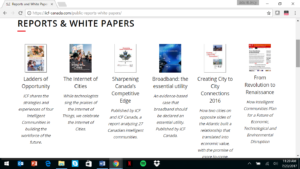
Check out: http://icf-canada.com/canadas-intelligent-communities/ and the videos on ICF Canada’s website: https://icf-canada.com/video/ , including our own new animation: “From Smart City to Intelligent Community” https://www.youtube.com/watch?v=dR1QZttXzGw and the new Cisco Smart Community video at https://www.youtube.com/watch?v=vXW7pQev1gI
The LSNetwork – An Enlightened Platform for Intelligent Communities
 The LSNetwork initiative (formally LightSavers Canada) was developed in 2008 and led by the Canadian Urban Institute (CUI) since 2012. LSNetwork’s purpose is to help accelerate the adoption of networked LED streetlights to build the platform for intelligent communities. Its 2017 program focuses on assisting late LED streetlight adopters; promoting adoption of networked streetlight control systems; and supporting the development of digital master plans for intelligent communities. As a non-profit, non-partisan organization, CUI’s efforts support these technology transformations by creating freely-available resources and convening conversations between key stakeholders and market leaders. More information, including access to presentations and Webinar videos as well as opportunities to help sponsor the initiative is available at www.lightsavers.ca.
The LSNetwork initiative (formally LightSavers Canada) was developed in 2008 and led by the Canadian Urban Institute (CUI) since 2012. LSNetwork’s purpose is to help accelerate the adoption of networked LED streetlights to build the platform for intelligent communities. Its 2017 program focuses on assisting late LED streetlight adopters; promoting adoption of networked streetlight control systems; and supporting the development of digital master plans for intelligent communities. As a non-profit, non-partisan organization, CUI’s efforts support these technology transformations by creating freely-available resources and convening conversations between key stakeholders and market leaders. More information, including access to presentations and Webinar videos as well as opportunities to help sponsor the initiative is available at www.lightsavers.ca.
ICF Canada to launch a Smart Community Committee to focus on Canada’s Smart City Challenge

A $300M commitment was made in the 2017 budget to support Canadian municipalities in a Smart City Challenge to come up with innovative proposals which could lead to ground-breaking “smart city projects”. At its Board Meeting last month, the ICF Canada Board has mandated ICF Canada to offer its members from among the private sector, municipalities and local institutions a platform for this conversation and to potentially develop collaborative opportunities among them that could potentially apply for these prizes. This is just one of the committees that ICF Canada has developed. Another is the Technical committee that developed the critical report: Broadband: the Essential Utility, which is free to anyone and available at https://icf-canada.com/public-reports-white-papers/. Anyone can become a member of ICF Canada, from a local municipality that is working toward becoming recognized as a Smart21 city to individuals and small businesses as well as universities and large companies involved in this space. They are then welcome to join the committees, participate in our initiatives and contribute to our blogs and other website opportunities. To join, see: https://icf-canada.com/memberships/
ICF on Bloomberg Radio
July 27 at 2:45 pm Bloomberg Markets PM: “What Makes a City Livable?”
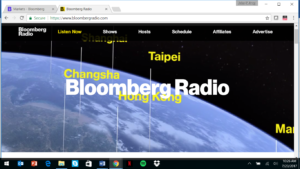
ICF on Bloomberg Radio: Check out Robert Bell’s interview on Bloomberg Markets PM on July 27 at 2:45 pm. The topic is “What Makes a City Livable?”
Every year, The Economist Intelligence Unit publishes a ranking of cities how good a place they are to live and work. In 2016, for the sixth year in a row, The Economist named Melbourne, Australia as the world’s most livable city. Last month in New York City, the Intelligent Community Forum named Melbourne as its Intelligent Community of the Year based on the community planning and engagement that has made it such a great place to live and work in.
What exactly makes one city more livable than another? Is it true that the top-ranked cities for livability tend to be small or midsized? What’s their advantage over big cities like New York and Atlanta, Los Angeles and San Francisco? How can big cities make themselves better places to live for residents and commuters?
Check out the conversation at https://www.bloombergradio.com/shows/bloomberg-markets-pm/ Bloomberg Markets PM – July 27 at 2:45 pm.

Are you interested in Blockchain?
ICF Canada can help its members to arrange a comprehensive professional development program suitable for executives and business and technology professionals on Blockchain and digital transformation. The program leads to a globally unique and only CIO Certified Blockchain Professional designation, offered in partnership with a not-for-profit association of CIOs, CDOs, CSSOs, CTOs who are typically mandated with the implementation.
It is important for all members of an organization from the CEO, CMO, CFO and CIO and their staff to “speak the same language” when it comes to Blockchain and other emerging technologies, especially where there are no current standards and no “common book of knowledge” around this topic.
Accordingly, ICF Canada recommends a workshop that can be tailored to the audience interest which can also cover several emerging tech alongside Blockchain (IoT, AI, etc.) including case studies relevant to the audience sector focus. The program is vendor agnostic. It covers several different Blockchain technologies (Ethereum, Bitcoin, Hyperledger Fabric, Ripple, etc.) and deployment models, governance models, business cases, and use case considerations. This comprehensive program covers all the key practical considerations that are relevant today and going forward for enterprises. Participants of the bootcamp who pass the exam and the capstone project earn the CIO Certified Blockchain Professional designation which is issued in partnership with the non-profit association.
ICF Canada can help you set up a one or two day Blockchain Bootcamp. If interested, ICF Canada can forward to you the complete curriculum, certification requirements, pre-requisites and agenda. Testimonials are also available upon request. Please contact Michael at [email protected] for further information.
Blog: Using the Intelligent Community Platform to Inspire Collaborative Cross-City Teams

Cities are not static geographic entities. They are constantly changing environments where people live, work, explore and raise their families. They also have constantly changing requirements and must be resilient to challenges, sometimes threatening and others slowly transforming them. Communities of all shapes, sizes and locations share some common challenges that make them similar.
People are at their heart; they want their communities to be safe and desirable to keep their children near as they grow while being able to attract and retain investment necessary for their communities to thrive. They want safe, comfortable and efficient mobility of all kinds; access to clean air and water; to keep and share their culture and heritage; and opportunities for people to experience interesting streets, spaces, parks and wide-open spaces in and near their community. They want connectivity for their families and friends but they also want to be able to benefit from the latest technology and applications that can help their community to prosper in a globally competitive world. They also want to have a healthy, secure and enjoyable ecosystem in which technology enables their lives to benefit without it impacting their privacy or tying them to a solution that is costly or no longer meets their community’s needs.
In short: they want their communities to offer a high quality of life and transform into a very livable community for them, their families and their neighbours. In this, communities are almost always the same; just different in scale, location and attitude. Some have access to more capital, talent and leadership. Some have less crime, traffic stress and resources. But all may be impacted by climate change, constant disruption in the economy and changing demographics. The approach to solving many of these challenges have tended to be fragmented and solutions scattered as independent and loosely funded pilots. Interoperability is often not a consideration as one solution may not be designed to be replicated elsewhere. But not all is lost. We are still early in this game. Learning from failure and successes and identifying gaps and understanding opportunities through benchmarking, we may be able to find a way ahead that everyone may be able to benefit from.
Using the Intelligent Community model to build a successful and resilient community on may be a direction that every town, city and region could benefit from. Intelligent Communities are those which look toward holistic approaches and solutions that are scalable and replicable. All sizes and forms of communities could learn from each other. With this inspiration and shared wisdom, each of them can then solve their challenges in their own terms. Making available the opportunity to share the wisdom and access to affordable solutions is often the hard part. Sometimes getting started is what is needed. Understanding the big picture and just getting started within that context, no matter how small and perceptually insignificant it might appear, may be just the right thing to do. Even larger communities hesitate and can be inspired by what smaller communities have been able to achieve.
The Intelligent Community Forum started with the belief that the road to a city’s prosperity was a transformative attitude that came through a sense of community. People were always at the heart of this movement. Technology enabled people to do good things and through adoption and constant improvement of these technologies, people would develop the talent and experience to constantly innovate and help each other to collaborate and succeed. This would generate an appreciation of all members of society in the digital era and a sense of appreciation to create and retain the best aspects of the community possible through economic, social, environmental and cultural protection and enhancements. Advocating this sense of an inclusive community and sharing the benefits and responsibilities among all its citizens has also been core to the movement. Through good governance, public policies and a healthy public-private and institutional ecosystem, the entire community would benefit and its unique brand as a successful Intelligent Community could be highly attractive to external investment and talent to become part of it.
This recipe for success has been the core message of the Intelligent Community movement for two decades. The Intelligent Community Forum celebrated the success of communities from the very beginning through sharing the insights of successful communities annually in its awards program, often inspiring others to learn from these successful communities and apply their own solutions to local conditions. This has helped to transform numerous communities globally; nearly 160 of them to-date having been recognized by ICF as global models through its SMART21 and TOP7 Intelligent Community awards.
Building on the Intelligent Community platform is now another way for communities to benefit. ICF has always encouraged communities to work with each other, to learn from each other and potentially build relationships that could lead to cross fertilization of trade, education and other activities between and among these like-minded communities. Many ICF qualified communities have initiated contact to undertake two-way trade and investment through delegation visits and institutional linkages. But more can be done using the Intelligent Community platform to develop cross-city teams that could strategically develop initiatives leading to solutions for many common challenges that these cities might experience and be able to share. Through this approach many challenges associated with growing urbanization and the barriers to cost can potentially be overcome, leading to a better quality of living for all.
Research shows that our communities are interconnecting at a fast pace with billions of devices across cities being connected annually. Sensors, cameras and many other monitoring devices are being deployed, many of which are not able to be interoperable with others inside their city and externally. This fragmented approach has its roots in early adopter communities that have smart city pilots underway; others are in the early planning stages with a preferred vendor; while many are still scratching their heads trying not to fall into a cavern of technological uncertainty which might negatively impact their limited resources. Consequently, communities share another common trait. Their decision makers usually tend to be risk adverse. Sourcing funds for one project over another is a constant challenge. Another is the lack of internal municipal coordination and differing priorities among departments and civic leaders, making it difficult to come to an alignment of goals. A clear path through an agreed upon roadmap, often needing a champion to deliver, such as a strong mayor with a vision, can be the difference between success and mediocrity in a community. Empowering cities to work together to solve the challenges before them today and in the coming years is a necessary evolution from competing cities where the competitive advantage over other communities was the only direction available to them for success.
John G. Jung, ICF Chairman and Co-Founder
Upcoming Events
http://globalforum.items-int.com
The 26th edition of the Global Forum/Shaping the Future (October 2nd & 3rd) is co-organized with the City of Winnipeg and the University of Winnipeg, with the support of the Premier of Manitoba. It is an annual, international, high profile, thought-provoking and self-sustained event dedicated to business, policy and strategy issues affecting the Digital Society gathering each year, more than 300 key policy-makers and public/private stakeholders from more than 30 countries, from all continents.
For more information, please consult the GF website: http://globalforum.items-int.com/
October 17, 2017 | Ottawa
Your Forum for Connecting Government & Technology to
Drive Public Sector Transformation in Canada!
https://www.canadianinstitute.com/govconnect-canada-2017/apply-now/
March 20-22, 2018 Toronto, Ontario
THINK CANADA 2018 GLOBAL BUSINESS SUMMIT
An Elite One-Stop Opportunity to Expand Your Business to Canada
LET US FIND YOUR MATCH
Distributors
Clientele/Customers
Site Selection
Suppliers
Government Incentives & Grants
Joint Venture Partners
LET US GUIDE YOUR EXPANSION
Legal Advisory Services
Immigration Law
Accounting & Finances
Sales/Marketing
Real Estate
Talent Acquisition / HR Services
Early Bird Price Until Aug 1st, 2017
More information to come:
http://thinkcanada.org/
Mark your Calendars:
 LONDON 2018 SUMMIT
LONDON 2018 SUMMIT
June 2018 – watch for new ICF theme and details about the London ICF Summit

NEWS:
Waterloo’s Open Text bets on AI
According to InsightaaS “The Information Company” is moving with machines to a new digital era marked by software automation. OpenText, the Waterloo, Ontario based startup that has grown to a position of global leadership in enterprise content management, is now reinventing itself, transitioning from a provider of enterprise platforms for humans to a creator of data platforms for humans and machines.
To read more, see InsightaaS:
http://insightaas.com/opentext-in-the-machine-era/
Communitech @20: Made in Waterloo Region – The Gamechanger
Regulation of Drones in Canada
Hyperloop will transform transportation as we know it today
Four technologies that are making a difference in 2017
Tesla making inroads in Canada
![]()
![]()
Want to have a voice in iCommunity.ca, the official newsletter of ICF Canada? Please send your blogs, announcements and other interesting content to John G. Jung at [email protected]
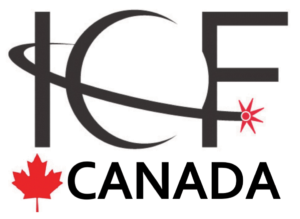
ICF Canada 1310-20 Bay Street Toronto, Ontario M5J 2N8 www.icf-canada.com
Contact: John G. Jung at [email protected] 1-647-801-4238 cell
Want to change how you receive these emails?
You can update your preferences or unsubscribe from this list
